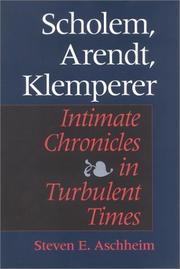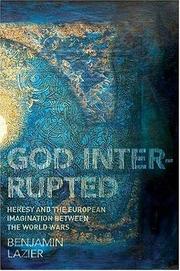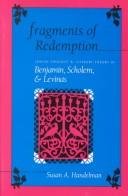| Listing 1 - 5 of 5 |
Sort by
|
Book
ISBN: 1283061120 9786613061126 9047433769 9004168397 Year: 2008 Publisher: Leiden ; Boston : Brill,
Abstract | Keywords | Export | Availability | Bookmark
 Loading...
Loading...Choose an application
- Reference Manager
- EndNote
- RefWorks (Direct export to RefWorks)
The American historian of ancient religions, Morton Smith (1915-1991), studied with the great scholar of Jewish mysticism, Gershom Scholem (1897-1982), when he was in Jerusalem during the Second World War. After the war, the two started a long, fascinating and at times intense correspondence that ended only with Scholem's death. These letters, found in the Scholem archive in the National Library in Jerusalem, provide a rare perspective on the world and the approach of two leading historians of religion in the twentieth century. They also shed important new light upon Smith's discovery of a letter attributed to Clement of Alexandria referring to a secret Gospel of Mark.
Scholem, Gershom --- Smith, Morton --- Scholem, Gershom Gerhard, --- Smith, Morton, --- Shalom, Gershom, --- Sholem, Gershom, --- שלום, גרשם --- שלום, גרשם, --- שלום, גרשום --- גרשם, שלום --- סמית, מורטון,

ISBN: 0253338913 0253214467 0253108691 9780253108692 1282066145 9781282066144 9780253338914 9780253214461 9786612066146 Year: 2001 Publisher: Bloomington (Ind.) Indiana University Press
Abstract | Keywords | Export | Availability | Bookmark
 Loading...
Loading...Choose an application
- Reference Manager
- EndNote
- RefWorks (Direct export to RefWorks)
Scholem, Arendt, KlempererIntimate Chronicles in Turbulent TimesSteven E. AschheimThe way three prominent German-Jewish intellectuals confronted Nazism, as revealed by their intimate writings.Through an examination of the remarkable diaries and letters of three extraordinary and distinctive German-Jewish thinkers -- Gershom Scholem, Hannah Arendt, and Victor Klemperer -- Steven E. Aschheim illuminates what these intimate writings reveal about their evolving identities and world
Jews --- History --- Identity. --- Intellectual life --- Scholem, Gershom Gerhard, --- Arendt, Hannah, --- Klemperer, Victor, --- Germany --- Ethnic relations. --- Hebrews --- Israelites --- Jewish people --- Jewry --- Judaic people --- Judaists --- Ethnology --- Religious adherents --- Semites --- Judaism --- Shalom, Gershom, --- Sholem, Gershom, --- שלום, גרשם --- שלום, גרשם, --- שלום, גרשום --- גרשם, שלום --- Blücher, Hannah Arendt, --- Bluecher, Hannah Arendt, --- Ārento, Hanna, --- Arendt, H. --- Arendt, Khanna, --- ארנדט, חנה --- アーレント, ハンナ, --- Identity

ISBN: 1400837650 128296478X 9786612964787 9781400837656 9780691136707 069113670X 6612964782 0691155410 9781282964785 9780691155418 Year: 2010 Publisher: Princeton, NJ
Abstract | Keywords | Export | Availability | Bookmark
 Loading...
Loading...Choose an application
- Reference Manager
- EndNote
- RefWorks (Direct export to RefWorks)
Could the best thing about religion be the heresies it spawns? Leading intellectuals in interwar Europe thought so. They believed that they lived in a world made derelict by God's absence and the interruption of his call. In response, they helped resurrect gnosticism and pantheism, the two most potent challenges to the monotheistic tradition. In God Interrupted, Benjamin Lazier tracks the ensuing debates about the divine across confessions and disciplines. He also traces the surprising afterlives of these debates in postwar arguments about the environment, neoconservative politics, and heretical forms of Jewish identity. In lively, elegant prose, the book reorients the intellectual history of the era. God Interrupted also provides novel accounts of three German-Jewish thinkers whose ideas, seminal to fields typically regarded as wildly unrelated, had common origins in debates about heresy between the wars. Hans Jonas developed a philosophy of biology that inspired European Greens and bioethicists the world over. Leo Strauss became one of the most important and controversial political theorists of the twentieth century. Gershom Scholem, the eminent scholar of religion, radically recast what it means to be a Jew. Together they help us see how talk about God was adapted for talk about nature, politics, technology, and art. They alert us to the abiding salience of the divine to Europeans between the wars and beyond--even among those for whom God was long missing or dead.
Gnosticism --- Pantheism --- Heresy --- Jewish philosophy --- God (Judaism) --- Cults --- Philosophy --- Religion --- Panentheism --- Heresies --- Offenses against religion --- Apostasy --- Judaism --- History --- History of doctrines --- Strauss, Leo. --- Scholem, Gershom, --- Jonas, Hans, --- Europe --- Intellectual life --- Scholem, Gershom Gerhard, --- Jews --- Philosophy, Jewish --- Philosophy, Israeli --- Shalom, Gershom, --- Sholem, Gershom, --- שלום, גרשם --- שלום, גרשם, --- שלום, גרשום --- גרשם, שלום --- Jonas, Hans, - 1903-1993. --- Scholem, Gershom Gerhard, - 1897-1982.

ISBN: 0585181810 9780585181813 0253326958 0253206790 9780253326959 9780253206794 Year: 1991 Publisher: Bloomington, Ind. Indiana University Press
Abstract | Keywords | Export | Availability | Bookmark
 Loading...
Loading...Choose an application
- Reference Manager
- EndNote
- RefWorks (Direct export to RefWorks)
Judaism --- Jews --- Cultural assimilation --- Benjamin, Walter, --- Scholem, Gershom Gerhard, --- Lévinas, Emmanuel --- Scholem, Gershom, --- Lévinas, Emmanuel. --- Shalom, Gershom, --- Sholem, Gershom, --- שלום, גרשם --- שלום, גרשם, --- שלום, גרשום --- גרשם, שלום --- Benjamin, W. --- Views on Judaism. --- Jewish religion --- Scholem, Gershom --- Levinas, Emmanuel --- Benjamin, Walter --- Holz, Detlef, --- Banyaming, --- Benʼyamin, Varutā, --- Peñcamin̲, Vālṭṭar, --- Binyamin, Ṿalṭer, --- בנימין, ולטר --- בנימין, ולטר, --- ולטר, בנימין, --- Penyamin, Palt'ŏ, --- 벤야민 발터,
Book
ISBN: 0231518307 023114654X 1322529531 Year: 2008 Publisher: Columbia University Press
Abstract | Keywords | Export | Availability | Bookmark
 Loading...
Loading...Choose an application
- Reference Manager
- EndNote
- RefWorks (Direct export to RefWorks)
This book features a CD of rarely performed music, including a specially commissioned rap by Erik Weiner of Walter Benjamin's "Thesis on the Philosophy of History." Theodor W. Adorno was the prototypical German Jewish non-Jew, Walter Benjamin vacillated between German Jew and Jewish German, Gershom Scholem was a committed Zionist, and Arnold Schönberg converted to Protestantism for professional reasons but later returned to Judaism. Carl Djerassi, himself a refugee from Hitler's Austria, dramatizes a dialogue between these four men in which they discuss fraternity, religious identity, and legacy as well as reveal aspects of their lives-notably their relations with their wives-that many have ignored, underemphasized, or misrepresented. The desire for canonization and the process by which it is obtained are the underlying themes of this dialogue, with emphasis on Paul Klee's Angelus Novus (1920), a canonized work that resonated deeply with Benjamin, Adorno, and Scholem (and for which Djerassi and Gabrielle Seethaler present a revisionist and richly illustrated interpretation). Basing his dialogue on extensive archival research and interviews, Djerassi concludes with a daring speculation on the putative contents of Benjamin's famous briefcase, which disappeared upon his suicide.
Jewish philosophy --- Imaginary conversations. --- Conversation, Imaginal --- Conversation, Imaginary --- Dialogues, Imaginal --- Imaginal dialogues --- Conversation --- Dialogues --- Jews --- Philosophy, Jewish --- Philosophy, Israeli --- Philosophy --- Benjamin, Walter, --- Adorno, Theodor W., --- Scholem, Gershom Gerhard, --- Schoenberg, Arnold, --- Shenberg, Arnolʹd, --- Schönberg, Arnold, --- Schenberg, A. --- Shenberg, A. --- שנברג, ארנולד --- Shalom, Gershom, --- Sholem, Gershom, --- שלום, גרשם --- שלום, גרשם, --- שלום, גרשום --- גרשם, שלום --- Adorno, Theodor W. --- Wiesengrund, Theodor, --- Wiesengrund-Adorno, Theodor, --- Adorno, Teodor V., --- Adorŭno, --- אדורנו, תאודור --- אדורנו, ת. ו. --- Adorno, Th. W. --- Benjamin, W. --- Parnassus, Mount (Greece) --- Mount Parnassus (Greece) --- Oros Parnassos (Greece) --- Parnassos Mountain (Greece) --- Benjamin, Walter --- Holz, Detlef, --- Banyaming, --- Benʼyamin, Varutā, --- Peñcamin̲, Vālṭṭar, --- Binyamin, Ṿalṭer, --- בנימין, ולטר --- בנימין, ולטר, --- ולטר, בנימין, --- Penyamin, Palt'ŏ, --- 벤야민 발터, --- Schönberg, Arnold
| Listing 1 - 5 of 5 |
Sort by
|

 Search
Search Feedback
Feedback About UniCat
About UniCat  Help
Help News
News